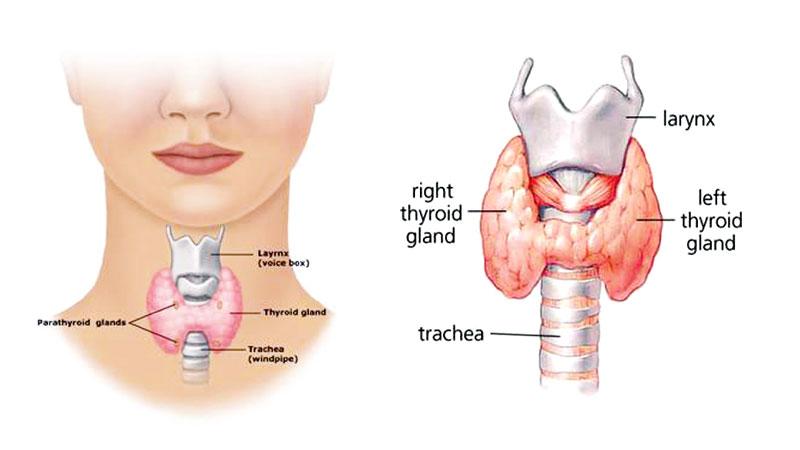
Hypothyrodism is a growing health concern in Sri Lanka with the number of patients seeking help daily rising despite interventions by the Health Ministry. A disease that cuts across age barriers it affects mostly women and even children, as a few pilot studies have shown . While all cases of thyroidism can be treated , women with a family history of goitre and those with preconditions such as diabetes type 2 , cancer and fatty liver are more at risk of the serious health impacts of the disease .
The Sunday Observer spoke to Family Physician , Ministry of Health Dr Ramya L Premarane for more insights into a common disorder which many women still don’t understand.
Excerpts …
 Q. While Hypothyrodism is a common health disorder among women not many understand this condition or even the gland that causes it. What is Hypothyroidism?
Q. While Hypothyrodism is a common health disorder among women not many understand this condition or even the gland that causes it. What is Hypothyroidism?
A. Hypothyroidism, also called underactive thyroid, is a common endocrine disorder, occurring as a result of thyroid hormone deficiency and can be categorized into primary, secondary or tertiary (central) depending on the basic pathophysiology. Primary hypothyroidism which marks the majority of the cases (95%) is due to an intrinsic defect in the thyroid gland itself. This condition leads to reduced production of thyroid hormones. Secondary or tertiary hypothyroidism occurs due to insufficient stimulation of the thyroid gland by TSH. This condition is caused by an underlying hypothalamic or pituitary disease.
Q. What gland is responsible for triggering it and where is it located ?
A. The thyroid gland. It is a butterfly-shaped gland that sits low on the front of the neck. Your thyroid lies below your Adam’s apple, along the front of the windpipe. The thyroid has two side lobes, connected by a bridge (isthmus) in the middle. When the thyroid is its normal size, you can’t feel it.
Q. How does this tiny gland contribute to maintaining human health?
A. The thyroid gland is a vital hormone gland: It plays a major role in the metabolism, growth and development of the human body. It helps to regulate many body functions by constantly releasing a steady amount of thyroid hormones into the bloodstream. If the body needs more energy in certain situations – for instance, if it is growing or cold, or during pregnancy – the thyroid gland produces more hormones.
The thyroid gland produces three hormones:Triiodothyronine, also known as T3, Tetraiodothyronine, also called thyroxine or T4 and Calcitonin
T3 and T4 are proper thyroid hormones. They are made in what are known as the follicular epithelial cells of the thyroid.
Iodine is one of the main building blocks of both hormones. Our bodies can’t produce this trace element, so we need to get enough of it in our diet. Iodine is absorbed into our bloodstream from food in our bowel. It is then carried to the thyroid gland, where it is eventually used to make thyroid hormones.
Sometimes our bodies need more thyroid hormones, and sometimes less. To make the right amount of hormones, the thyroid gland needs the help of another gland: the pituitary gland. The pituitary gland ‘tells’ the thyroid gland whether to release more or less hormones into the bloodstream. Also, a certain amount of thyroid hormones are attached to transport proteins in the blood. If the body needs more hormones, T3 and T4 can be released from the proteins in the blood and do their job.
The third hormone produced by the thyroid gland is called calcitonin. Calcitonin is made by C-cells. It is involved in calcium and bone metabolism.
T3 and T4 increase the basic metabolic rate. (BMR) They make all the cells in the body work harder, so the cells need more energy.
Q. How do you identify a thyroid disorder? What are the symptoms?
A. An underactive thyroid releases too little T4 and T3 into the bloodstream, causing the metabolism to slow down too much. The most common cause is Hashimoto’s disease. This is an autoimmune condition in which white blood cells and antibodies attack the thyroid gland. If not treated, the metabolism will continue to slow and ultimately death (in 10 to 15 years).
As far as the signs and symptoms of Hypothyroidism are concerned, most of the affected patients will present with slowed-down physical and mental activity. Some can also be asymptomatic, depending on the severity.
Major signs and symptoms include, fatigue, lethargy and inactivity; weight gain despite decreased appetite; unusual intolerance to cold; dry skin; hair loss; laziness and sleepiness; muscle or joint pain with or without weakness in the extremities; depression; mental impairment; forgetfulness; difficulty in concentrating; constipation; menstrual disturbances; subfertility; reduced perspiration; paraesthesia and nerve entrapment syndromes; blurred vision; impaired hearing; fullness in the throat and hoarseness of the voice
Q. Can it be prevented?
A. There is no way to prevent hypothyroidism, but people who may have a higher risk of thyroid problems, for example, women during pregnancy, should check with their doctor about the need for additional iodine. Screening is not recommended for those who do not have symptoms, unless they have the following risk factors:
- a history of autoimmune disease
- previous radiation treatment to the head or neck
- a goitre
- family history of thyroid problems
- use of medications known to affect thyroid function
Q. Can it be treated?
A. All thyroid diseases can be treated, resulting in normal thyroid function. However, this frequently requires being on medication to maintain the normal thyroid state.
Most patients with thyroid cancer can be cured through surgery and radioactive iodine treatments. While their cancer is cured, the curative treatment results in hypothyroidism requiring thyroid hormone replacement for life.
In summary, the most important aspect of thyroid disease is that effective treatments are available that can restore thyroid function to normal, even if the underlying cause of the disorder is not ‘cured’. Once diagnosed with thyroid disease, patients need lifelong medical follow up to ensure that their thyroid function remains in the best range.
Q. Delay in treating the disease- what are the most serious health impacts?
A. Congenital hypothyroidism (CH) is a treatable deficiency of the thyroid hormone that causes severe mental retardation and growth deficiency if it is not detected and treated early. Low concentrations of maternal thyroid hormones during early gestation delays neuro development of the fetus and may lead to lower intelligence. Hypothyroidism is the most common disturbance of thyroid function in children presented with various signs and symptoms. Therefore, physicians must be alert not to miss the diagnosis of hypothyroidism.
The most common manifestation of acquired hypothyroidism is the suppression of growth which leads to short stature. Thyroid hormones are crucial for proper development of the central nervous system. They are important from the early stages of fetal development.
Hearing loss is also more common in hypothyroid patients than normal population
Children who suffer from hypothyroidism may have a wide variety of dental problems, including malocclusion, delay in teeth eruption, swelling gums, and enamel hypoplasia
In addition, hypothyroidism may have some cardiac manifestations.
Hypothyroidism is also a common and well recognized cause of hair loss. Predominant cutaneous symptoms in hypothyroid patients include dry coarse skin, hair loss, puffy edema, xerosis and altered skin texture.
Q. Do they vary from person to person?
A. Yes. For instance , women need more iodine when they are pregnant because the baby gets iodine from the mother’s diet. People who have other autoimmune conditions, such as type 1 diabetes, rheumatoid arthritis or multiple sclerosis, also have a higher risk of developing hypothyroidism.
Q. Is cancer one of them?
A. Yes. In cancer, anyone who has received radiation to the thyroid, neck, or chest is also at greater risk for hypothyroidism.
Q. Is there a link between diabetes and Hypothyroidism?
A. Yes. It’s not uncommon to have both thyroid disease and diabetes. If you have type 1 diabetes, type 2 diabetes, insulin resistance, this doubles your risk of developing thyroid disease.
Q. Can mental stress and physical stress affect thyroid health? Is it correct that those with hypothyroidism who are also under stress , may experience more severe cognitive issues?
A.Yes. Stress may exacerbate an underlying thyroid condition. Under stress, your body releases the hormone cortisol. Too much cortisol can interfere with thyroid hormone production: It can stimulate the thyroid to work harder to create sufficient amounts of thyroid hormone. Also, when stressed, you’re more vulnerable to autoimmune thyroid conditions (eg, Hashimoto’s thyroiditis)
Stress can affect memory and other cognitive functions, but people with hypothyroidism who are also under stress may experience more severe cognitive issues.
Q. Who are most vulnerable- age-wise and gender wise?
A. Females and older people were found to have significant association with hypothyroidism.
Hypothyroidism is common in women, particularly those over 50, and the chances of a woman developing hypothyroidism are increased during pregnancy, after she gives birth, and around the time of menopause.
Q. Can babies get hypothyroidism?
A. A pilot study on Congenital Hypothyroidism is being carried out in the Kandy region and the incidence of congenital hypothyroidism has been estimated to be around 1 in 900 to 1 in 1,500.
Q. What are the tests available to detect it?
A. Thyroid Stimulating Hormone (TSH)— This is the pituitary hormone that measures the level of thyroid hormone in the blood.
1. Free T3/Free T4— will measure the level of active hormones in your blood.
2. Reverse T3— will help determine whether you have hyperthyroidism or hypothyroidism.
3. Thyroid Peroxidase Antibodies/Thyroglobulin Antibodies (TPO/TG Antibodies)— Measures the antibodies and is a great test to spot the condition before it manifests through the TSH test.
4. Thyroid Ultrasound— Especially recommended if your doctor suspects abnormal growth or if you have a known thyroid condition.
Q. Fatty liver and thyroid- is there a link ?
A. Yes. Lower thyroid function is associated with an increased risk of fibrosis in Nonalcoholic fatty liver disease ( NAFLD ) patients. . It is one of the most common causes of chronic liver disease.
Q. How can you prevent thyroid disease?
A. Taking iodine supplements can prevent hypothyroidism. Diagnosing hypothyroidism early by testing newborn babies, pregnant women, and people with symptoms or risk factors is the best way to prevent it from worsening. The biggest risk factor is having relatives with thyroid disease.
